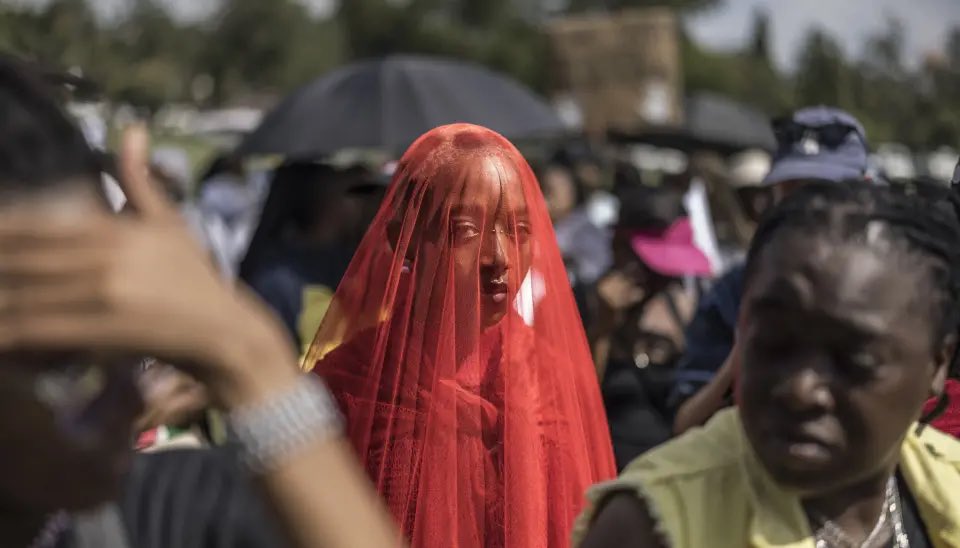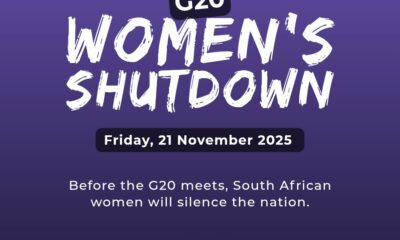News
South Africa Lies Down: A National Call to Build a Safer Country for Women and Children

“South Africa Is Lying Down Today”,A Nation Demands Safety for Women and Children
South Africans woke up today carrying a heavy truthone we’ve learned to carry far too often. For many women, survival is not a metaphor. It’s a daily calculation. A quiet negotiation with danger.
One survivor, whose story shaped today’s national conversation, still cannot speak her abuser’s name. She left him. She started over. She moved homes and cities. Yet fear clings to her like a shadowproof that escape is not the same as safety in this country.
Her story is horrifying not because it’s unusual, but because it’s heartbreakingly common.
And that, perhaps, is the most devastating thing about gender-based violence in South Africa:
It is no longer news. It is normal.
When Violence Becomes Ordinary, Outrage Becomes a Duty
Media guidelines say news should be unusual. Something that breaks the pattern. But the pattern here is relentless. Women are beaten, choked, shot, stabbed, set alight, and silenced with terrifying consistency.
Fifteen women murdered.
Every single day.
It’s a number that should halt the country in its tracks. Instead, it scrolls past our timelines between loadshedding updates and political scandals.
Yes, men are sometimes victims too, but those cases make up a sliver in a sea of violence overwhelmingly directed at women. The imbalance is so striking, some researchers describe it as a gendered pandemicone that has lasted decades.
At Midday, a Country Lies Down in Mourning and Defiance
At 12pm today, women across South Africa will lie down on pavements, office floors, lawns, and shopping malls. Some will stand still, dressed head to toe in black. Others will hold photographs of loved ones whose stories ended violently.
It’s called the Women’s National Shutdown, led by the nonprofit Women for Change (WFC). But it’s not really a shutdown. It’s a memorial. A protest. A warning. A plea.
And a question:
How many more must die before this stops?
Social media is already flooded with messages of solidarity and grief:
-
“I’m lying down for my sister.”
-
“I survived. I shouldn’t have had to.”
-
“This country doesn’t love women, but we’ll fight anyway.”
-
“Enough.”
The silence of the moment is what makes it loud.
A still body on the ground is a simple image. But in this country, it carries the weight of countless graves.
Ending GBV Is Not Just Government’s Job, It’s Everyone’s
There’s an uncomfortable pattern in South Africa: every time GBV spikes, leaders condemn it, politicians pledge new strategies, and corporates release statements. Then life moves onuntil the next horror trend.
But today’s movement insists that the responsibility can’t sit with survivors or the state alone.
Everyone has a role. Everyone has power.
And yes, businesses too.
Corporates often speak about transformation, sustainability, governance, community investment. But in a country where women die at rates comparable to conflict zones, no ESG report means anything if companies remain absent from the fight.
Workplaces shape culture. They influence attitudes. They have resources, networks, and platforms. They can fund shelters, employee GBV support systems, leave policies for survivors, education programmes for men, and crisis response mechanisms.
This is not about profit margins.
This is about lives.
And a safer South Africa benefits us allfamilies, employees, communities, and the national economy. Violence destabilises everything: homes, workplaces, schools, hospitals, and the very idea of hope.
The Story We Refuse to Accept
Some may argue that GBV is too deep-rooted, too widespread, too overwhelming to fix. But that’s not true.
Countries have changed the course of domestic violence through coordinated policy, strong policing, community mobilisation, early education, and corporate involvement. South Africa can too.
But first, we must refuse to accept this as normal. We must treat every story, like the woman who still trembles at her abuser’s name, as a national emergency, not an anecdote.
Because she is one of thousands living in fear.
Because 15 women will not survive today.
Because our silence has already cost too much.
Today, South Africa lies down.
Tomorrow, we stand up.
Together.
{Source: The Citizen}
Follow Joburg ETC on Facebook, Twitter , TikTok and Instagram
For more News in Johannesburg, visit joburgetc.com



























